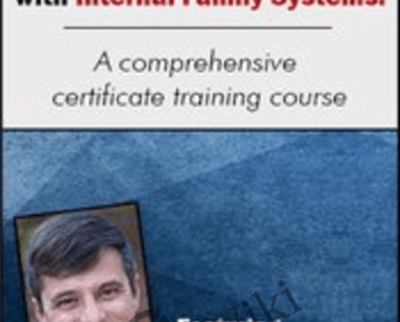Treating Complex Trauma with Internal Family Systems: A comprehensive certificate training course – Frank G. Anderson
Original price was: $299.99.$87.00Current price is: $87.00.
Treating Complex Trauma with Internal Family Systems: A comprehensive certificate training course – Frank G. Anderson Download. Add additional power to you…
Salepage link: At HERE. Archive:
Add additional power to your current clinical approach and make trauma treatment more effective in a shorter period of time when you incorporate Internal Family Systems (IFS) in your practice.
After decades of clinical breakthroughs and scientific research, the IFS model has been shown to be effective for healing even the most complex trauma. Join Dr. Frank Anderson, psychiatrist, author, and vice chair of the Foundation for Self Leadership — the leading organization dedicated to advancing the IFS model through research and training — in this comprehensive certificate course where he provides you a step–by–step guide for applying IFS into your clinical practice.
Throughout the course, special emphasis will be given to understanding how trauma affects the brain and how you can use IFS to heal complex trauma and its common co-morbidities, including anxiety, depression, panic, insomnia, obsessive-compulsive behavior and more.
You’ll also get exclusive insight into how neuroscience can inform why, how and what IFS techniques you should use to maximize your clinical outcomes — so you’ll know exactly how to empower your clients to overcome even the most complex traumas.
You’ll end this online course prepared to start integrating Internal Family Systems with your current clinical models, plus you’ll earn your Certificate in Treating Complex Trauma with Internal Family Systems.
Here’s what you’ll learn in this certificate training…
Accelerate the healing from complex trauma by integrating the IFS model into your current clinical practice.
Improve assessment and treatment planning with tools to help identify, specify, and clarify the protective parts of clients with trauma histories.
Protect clients from emotional and psychological pain by offering an alternate view of symptoms and psychopathology that shows clients how parts are trying to protect them.
Showcase a non-pathological perspective of mental health disorders by demonstrating how IFS translates common comorbidities into parts language.
Increase your curious and compassionate self when using IFS to work with clients who have trauma histories.
Improve clinical outcomes by learning how to differentiate between therapeutic and biological conditions.
Heal clients’ traumatic wounds through the unique IFS internal attachment model.
Handle extreme symptoms of trauma by determining if they are rooted in sympathetic activation or parasympathetic withdrawal.
Gain quicker access to your client’s traumatic vulnerabilities through IFS specific therapeutic techniques that shift arousal and withdrawal.
Use neuroscience to inform your therapeutic decision–making so you’ll know exactly what tool or strategy to use to help your clients heal.
Integrate IFS with your current treatment approaches including EMDR, DBT, and Sensorimotor Psychotherapy.
Through nine comprehensive video modules you’ll learn…
How to Treat the Various Types of Trauma
- Acute trauma
- PTSD
- Complex or relational trauma
- Developmental and attachment traumas
- Extreme or dissociative trauma
Internal Family Systems (IFS) Model
- The origins, goals & assumptions
- A non-pathologizing, accelerated approach, rooted in neuroscience
- How IFS differs from phase-oriented treatment
- The importance of our protective responses
- Dealing with emotional overwhelm head-on
- Multiplicity of the mind — we all have parts
- Clinical considerations for clients experiencing abuse
The IFS Technique
- Step 1: Identify the Target Symptom
- Applying meditation practices
- Separating the person (self) from the symptom
- Learning about its intention
- Step 2: Gain Access to Internal Strengths & Resources for Healing
- Moving from defensiveness to curiosity
- The “Self” of the therapist-countertransference redefined
- Accessing compassion to open the pathways toward healing
- Role of empathy in healing — the benefits and the downsides
- Step 3: Find the Fear and Function of the Symptom
- Focusing on its fear
- The real story behind the symptom
- Fostering the internal relationship
- Step 4: Healing of Traumatic Wounds
- Three phases to healing: Witness the pain, remove the wounded part out of the past, and let go of the feelings, thoughts and beliefs
- Science behind the healing — memory reconsolidation
Attachment Disorders and Relational Trauma
- IFS as internal attachment work
- Attachment styles as parts of self
- Attachment trauma- the role of the therapist
- Heal relational wounds of childhood
- Client’s “Self” as the corrective object
- Work with preverbal trauma
Manage Common Co-Morbidities
- Depression, panic attacks, substance abuse, eating disorders, ADD and OCD
- A non-pathological approach
- Comorbidities as protective responses to trauma
- Symptoms as “parts of the self”
Differentiate Therapeutic Issues from Biological Conditions
- Intersection of biology and situation (“Real Mind-Body Medicine”)
- Therapist’s role in biology — When to refer and when to work it through
- Psychotherapy of psychopharmacology
The Neurobiology of Trauma
- Neuroscience for therapists — what you need to know
- Fear circuitry and the development of PTSD
- Extreme reactions and Autonomic Nervous System
- Rage to suicide and dissociation to shame
Dealing with the Extreme Reactions of Trauma
- Talking directly to the symptom
- Introducing the part to the “Self”
- Dealing with the overwhelm — no need for building resources
- How to stay clear and calm while working with clients in extreme states
How Neuroscience Informs Therapeutic Decisions
- Top-down and bottom-up strategies rooted in neuroscience
- When it’s necessary to take over and “be the auxiliary brain” for your client
- When it’s best to slow things down, hand over control and work with the body
- Sensing vs. making sense of things
- At home strategies
Integrate IFS into Your Treatment Approach
- EMDR, DBT, Sensorimotor/SE and other methods
- Transformation vs adaptation or rehabilitation
- Going beyond the cognitive (experiential therapies)
- Integrating IFS with your current clinical approach
This intensive training also includes:
- Live demonstrations
- Meditations
- Practice sessions
Here's an overview of the prominent keywords and a list of famous authors:
Business and Sales: Explore business strategies, sales skills, entrepreneurship, and brand-building from authors like Joe Wicks, Jillian Michaels, and Tony Horton.
Sports and Fitness: Enhance athleticism, improve health and fitness with guidance from experts like Shaun T, Kayla Itsines, and Yoga with Adriene.
Personal Development: Develop communication skills, time management, creative thinking, and enhance self-awareness from authors like Gretchen Rubin, Simon Sinek, and Marie Kondo.
Technology and Coding: Learn about artificial intelligence, data analytics, programming, and blockchain technology from thought leaders like Neil deGrasse Tyson, Amy Cuddy, and Malcolm Gladwell.
Lifestyle and Wellness: Discover courses on holistic health, yoga, and healthy living from authors like Elizabeth Gilbert, Bill Nye, and Tracy Anderson.
Art and Creativity: Explore the world of art, creativity, and painting with guidance from renowned artists like Bob Ross and others.
All the courses on WSOlib are led by top authors and experts in their respective fields. Rest assured that the knowledge and skills you acquire are reliable and highly applicable.
Specification: Treating Complex Trauma with Internal Family Systems: A comprehensive certificate training course – Frank G. Anderson
|
User Reviews
Only logged in customers who have purchased this product may leave a review.

Original price was: $299.99.$87.00Current price is: $87.00.












There are no reviews yet.